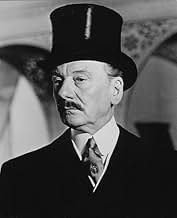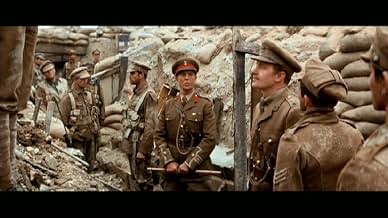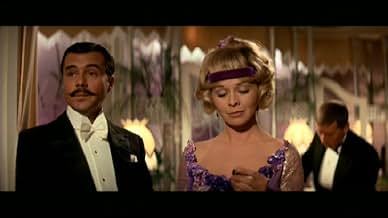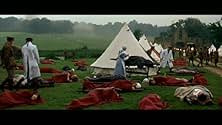अपनी भाषा में प्लॉट जोड़ेंThe working-class Smiths change their initially sunny views on World War I after the three boys of the family witness the harsh reality of trench warfare.The working-class Smiths change their initially sunny views on World War I after the three boys of the family witness the harsh reality of trench warfare.The working-class Smiths change their initially sunny views on World War I after the three boys of the family witness the harsh reality of trench warfare.
- निर्देशक
- लेखक
- स्टार
- 6 BAFTA अवार्ड जीते गए
- 8 जीत और कुल 8 नामांकन
फ़ीचर्ड समीक्षाएं
It is all the more telling for its simplicity - none of the many great actors taking part delivers a weighty pronouncement on the evils - or otherwise - of war; it is enough to see the awful toll posted on the cricket scoreboard that keeps the daily tally of dead. The ordinariness of the Smith family, who lose every last one of their young men to the conflict, the cheerful patriotism of the proud families waving their loved ones off to war, and the stupid banalities of the officers who daily send their men out to be killed only serve to highlight the absolute futility and waste of WWI and all the wars that followed.
Scenes of upper class twits at play while their servants are dying to preserve their privileges; the officers' ball where military leaders try to score points off each other, concerned only with protocol and promotion; and the brilliant black humor of the outdoor church service are juxtaposed with scenes from the trenches as we watch the young men die one by one, all the more harrowing for their cheeky humor and fatalism.
Why this brilliant film has been allowed to sink without trace is baffling; I first saw it in the early seventies, and today it still has the same impact. And sadly, it is just as relevant now as it was then - a testimony to our inability to learn from our mistakes.
Kudos go to first-time director (now Lord) Richard Attenborough, and a stellar cast that was essentially the British Pantheon, circa 1969.
I have never seen anything remotely like this, and I doubt if I ever will again. Emotional? If you don't have a few tears by the time they're playing "No, We'll Never Tell Them,"...better check for a pulse.
Until I saw the movie, I didn't realize that there was some special music that accompanied WWI. It's music that now brings a tear whenever I hear it. The portrayal of pompous generals and their subservient minions, as they are posting the numbers of deaths and casualties for the day, is beautifully done. They were simply putting up numbers. But each number was often a death. A death of a promising young person. This movie makes war appear as brutal as it can really be. The poor always die first. It would be nice if international law demanded that the political and military leaders of a country be required to send their own children into war first. If that were the case, there would likely be no more war.
I saw it again 5 years later, in a revival house. I went with a high-school friend, happy to be able to introduce its power and brilliance to someone new. It blew her away completely.
That was 27 years ago, and I would give almost anything to know if the film could still move me as much as it did those first two times. It is not available on video, and I've never seen it broadcast on any TV channel.
This is truly one of those films that burned itself into my memory at first viewing. I urge anyone who finds the chance to see it to run, not walk, to the theatre! The Great War -- the War to End All Wars -- has faded deep into the past for most people, and we forget that the death-toll from that conflict blighted an entire generation. This film makes that loss all too vivid, using the music of the war itself.
Truly a classic, in the most literal sense of the word: a film for the ages.
क्या आपको पता है
- ट्रिवियाThe song "La Chanson de Craonne" ("Adieu la Vie"), sung by Pia Colombo (Estaminet Singer) in this movie, commemorates a mutiny in 1917 by French troops. Merely singing it was considered an act of mutiny, and it was banned in France until 1974. During the war, a reward of one million francs and immediate honorable release from the Army was offered for the identity of the author, but never claimed.
- गूफ़Sir Edward Grey (Ralph Richardson) is shown early in the film being accompanied by his wife, described in the credits as Lady Pamela Grey. In fact, Grey did not marry Pamela (nee Wyndham, and the widow of Lord Glenconer) until 1922.
- भाव
Soldier Singer: It was Christmas Day in the cookhouse, the happiest time of the year, Men's hearts were full of gladness and their bellies full of beer, When up popped Private Shorthouse, his face as bold as brass, He said We don't want your Christmas pudding, you can stick it up your... tidings of co-omfort and joy, comfort and joy, o-oh ti-idings of co-omfort and joy. It was Christmas Day in the harem, the eunuchs were standing 'round, And hundreds of beautiful women were stretched out on the ground, Along came the big bad Sultan, and gazed on his marble halls, He said Whaddya want for Christmas boys, and the eunuchs answered... tidings of co-omfort and joy, comfort and joy, o-oh ti-idings of comfort and joy.
- क्रेज़ी क्रेडिटOpening credits prologue: The principal statements made by the historical characters in this film are based on documentary evidence and the words of the songs are those sung by the troops during the First World War
- कनेक्शनFeatured in Love Tory: A Film Portrait of Alan Clark (1993)
- साउंडट्रैकOh, It's a Lovely War
(uncredited)
Written by John Long and Maurice Scott
Performed by John Mills and chorus
टॉप पसंद
- How long is Oh! What a Lovely War?Alexa द्वारा संचालित
विवरण
बॉक्स ऑफ़िस
- US और कनाडा में सकल
- $8,01,591
इस पेज में योगदान दें































